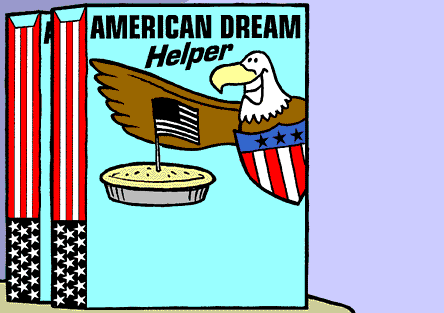Portrayals of the American Dream are everywhere. In films. TV. Art. Music. Political speeches. Advertisements. We want to believe that things will get better, that if we just work hard, we will be given the opportunity to succeed.
For example, Aerosmith released their hit song "Dream On" in
1973, and it quickly shot up to #5 on the charts, and the lyrics still connect to Americans. It's been covered by
Miley Cyrus, Alicia Keys, and many other well known and unknown artists. (Listen to one of the links while you read. It will place this post in context!)
"Dream
On" is a song about aging. A song that reflects the understanding that
life is short. We live. We die. We chase our dreams. But we don't
know how long we have to achieve them.
When
asked about the song meant, song writer Steven Tyler asserted, “It’s
about the hunger to be somebody: Dream until your dreams come true.”
It's about The American Dream.
But where did this dream come from?
White and Hansen explore this question in "The Making and Persistence of the American Dream," the introduction to their anthology The American Dream in the 21st Century (2011).
After examining the origins of the dream, they review what others have said about the American Dream over the years and then offer some reasons why the dream persists even when it is so hard to achieve.
In this post, do not merely summarize what they say. (Seriously, there is too much there to summarize, and besides, we already read the chapter so we know what it says.)
What I'd like you to do is to choose a part of this chapter that is interesting, problematic, or surprising to you, briefly review what Hanson and White say in this section, and then add something new. Add analysis. Add why this section is significant. Add examples from your own life or what you have seen or heard in the real world.
This is similar to what you wrote last week, but this time your audience is different. You are not writing for ME; you are writing for the students in this class. How does this context change the way you write. Also, this time you are not writing an academic paper; this time you are writing a blog. How does that genre shift change your style of writing? Your presentation?
You should use at least one short quotation from the text. (When choosing a quotation, consider the context in which White and Hanson make this quotation, recreate that context, introduce the quotation, provide analysis about what this means and add why the quotation matters.)
Oh yeah. Respond to at least two other student blogs. Don't just say, "Yeah. Me too." No. Add something.



No comments:
Post a Comment